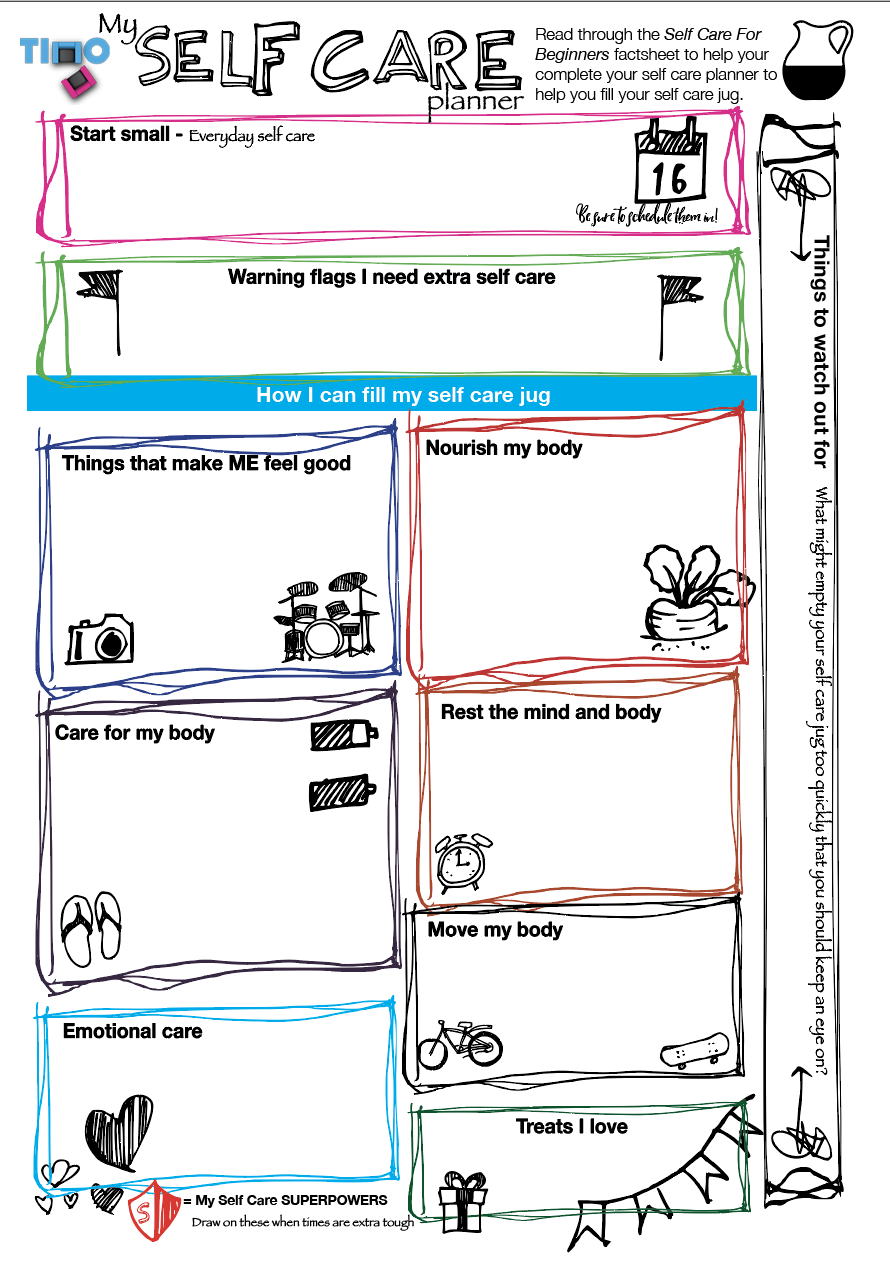Self care for beginners + create a self care plan
If like many of us, you’re not very good at practising self care or even comfortable talking about it, then this factsheet aims to help you action self care at all stages of your wellbeing. For many people it’s easier to step up and look after others than ourselves, but learning to look after YOU is essential to avoid burn out.
Your Self Care Jug
Think of self care like a jug of water; it’s important the jug always has water in it so you can drink to stay healthy, but also allows you to offer others a drink when needed, but that means you need to consciously do things to top up the jug every day.
There are elements of self care which should be part of our everyday routine, just like brushing your teeth, others you might activate a few times a week which provide a big top ups, or some you pull on when times are extra tough. Knowing and planning for these ensure you keep your self care level healthy.
 Create a self care plan
Create a self care plan
To help plan your self care strategies read the info below and then complete the Self Care Planner. Why not stick this next to your bed, or mirror, to help you check in each day.
Nothing is too small when it comes to self care
What can you do or include in your everyday routine so some aspects of self care become your everyday day norm?
Some essential maintenance things to think about:
- Make your bed
- Have a shower
- Eat breakfast
- Meditate/exercise
- Read before bed instead of screen time
- Walk the dog each morning
- Weekdays get to bed before 10pm
- Make a daily ’to do’ list
- Drink plenty of water….
Think about what works for you and consider the different areas of your self care from emotional, physical, nourishment, rest and relaxation. The key to making these happen is to schedule them in so there is space in your day to complete them so they can become part of your self care routine.
Make time for what makes YOU feel good
Take some time to think about what makes you feel good.
Some suggestions might be:
- Drawing, colouring-in, music, sing, play a musical instrument, dance
- Spending time with your pet
- Hobbies / sport
- Catching up with <insert your awesome person/s here> via phone, skype etc
- Watching your favourite comedian, musicians
- Preparing a shopping list and include a special meal
The self care planner helps you look at this in relation to various aspects of your health from your emotional to physical self care. Can you look at adding some of these into your schedule for the next week or even make it an everyday essential for a while if your jug is low?
Recognising what empties your jug
As well as knowing what boosts your self care think about what depletes it. Noting these and looking for warning signs can help you activate other aspects of your self care plan. These things might be:
- Not eating well
- Drinking too much alcohol
- Spending time with a friend who negatively impacts on your self esteem
- Too much social media time
- Make note of these so you can keep an eye on them creeping in and emptying your jug
When do you need to call on your ‘Self Care Superpowers’
What raises the red warning flag that you need to implement extra self care strategies as your self care jug is getting low or being drained too quickly? Knowing what these are can help you take action early.
Some signs might be:
- Not completing your everyday self care essentials
- Not sleeping well
- Negative head chatter (you know that annoying voice in your head)
- Avoiding social situations virtually or in-person
- Feeling stressed for more than one day
- Being short-tempered with family and friends
If these signs keep recurring and persisting, then it’s time to activate some extra self care. On the self care planner, you can mark certain items your Self Care Superpowers, for example you might find making time for 30 minutes of physical exercise is very important, or calling a friend or a support service for a check when required.
Let others know what works for you
Once you’ve created your plan you might like to share it with other people close to you. This will help them know what is important to you, they can then also support you to put them into action.
Download a copy of this factsheet and our TLC for beginners action template and fill it out to get your TLC started!
For citing purposes:
Cheong-Clinch, C. & Tune In Not Out. (2020). Self-care for beginners. [factsheet]. http://www.tuneyourmood.com/useful-stuff/
Thanks to young people for their helpful feedback.
Also check the related topics:
Self Care Sleep Health





